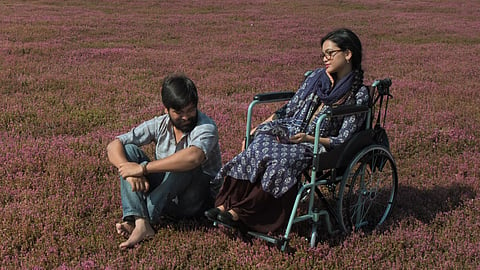
- HOMEGROWN WORLD
- #HGCREATORS
- #HGEXPLORE
- #HGVOICES
- #HGSHOP
- CAREERS
- ABOUT US
- CONTACT US

"Life can’t be defined. The rhythm of life is the definition in itself," reads a poet and father of a girl with a disability in Bobby Sarma Baruah's latest film. But If life’s essence lies in its rhythm, then what does it mean for someone who cannot move? Does this rhythm belong only to the body, or can it be created in the stillness of the mind and the immensity of imagination? 'Rador Pakhi' (Morning Sunshine) enters this fragile space, tracing the story of a young woman whose life is shaped by both immobility and a fierce creative interiority, and asking us to reconsider what it means to live fully.
Premiering internationally at the Indian Film Festival of Melbourne 2025 after its world premiere at IFFI last year, the Assamese-language film tells the remarkable story of writer Sarmistha Pritam, fictionalised here as Jyoti Baruah. Diagnosed with spinal muscular atrophy as a child, she spends her life confined to her bed. Yet this confinement does not become her identity. Instead, her room fills with notebooks, paintings, colours, and words — an interior universe where she learns to alchemise her pain and shame into beauty.
Bobby, who has previously directed 'Mishing' (The Apparition) and 'Sikaisal' (If Only Trees Could Talk), approaches Jyoti’s story with characteristic tenderness and a meditative expansiveness that spans beyond the themes of disability. Beyond directing, she has also written the story, screenplay, and dialogue, while also overseeing the film’s production design. It is as much a work of artistic devotion as it is a cinematic one. Jyoti's character is played by Bobby's daughter, Sulakhyana Baruah, tends to it with grace and poignancy. The rest of the film is masterfully supported by actors Kamal Lochan, Arun Nath, and Bina Patangi.
The film opens with a difficult scene: Jyoti, after waking up, soils herself in bed and must wait for her mother to clean her. It is a deeply dehumanising introduction, situating her in a humiliation often linked to the reality of a life with disability. Over the course of the film, it is this very point that marks the arc of her journey towards dignity. The film is slow paced mirroring her condition: gentle, attentive to the minutiae of daily life. We're grounded by the actions like her mother arranging pillows to prop her up, bringing her food, and fetching her books, while her father lifts her outside to bask in the sun or takes her around the house.
The smallest tasks reveal the immense labour everyday life requires that we take for granted as able-bodied people. In the film, this also becomes a labour of love by her parents that sustains her. For someone who is immobilised, there is a lot of movement both around and inside Jyoti. She's constantly reading, writing or painting, and sometimes giving us glimpses of how she views herself — be it dancing in the forest, swaying on a swing or frolicking through a field of flowers — in her own unique worlds, she's unrestricted by her body.
Even while centring the film around a disability, Bobby rejects the saviour narrative. Be it the dependence of Jyoti on her parents for her daily rituals, the art and creativity that becomes her respite, or even a romantic relationship that she shares with Pragyan, a man she comes to know from her father's poetry readings — everything is rooted in love and devotion. The journey that takes place in Rador Pakhi never focuses on how Jyoti is saved, but how she blooms in an ecosystem of care.
And yet this isn't your typical 'motivational film' by a long shot. Bobby refuses that fetishisation of both despair and triumph by never quite leaning one way too hard. In her story, the grief isn't ever absent, even in moments of ecstasy. As Jyoti rises, finding more and more of herself, through her writing and relationship, her father starts losing parts of him to Alzheimer's.
Pain, in 'Rador Pakhi' is always right around the corner, and the characters just learn to find their footing despite it. In all its generous subliminality, the film is the perfectly balanced cocktail of contradictions life usually gives us, and a humanist study of our capacity to experience it all and still be whole.
Follow Bobby Sammy Baruah here.
If you enjoyed reading this here's more from Homegrown:
'Jeevi' Is A Magical Realism Short That Explores The Limitations Of The Human Mind
'Behind The Ears' Is An Intimate Portrait Of Individuals Living With Hearing Impairment
Puppets Of Desire: The Enduring Power Of Manik Bandyopadhyay's 'Putul Nacher Itikotha'
